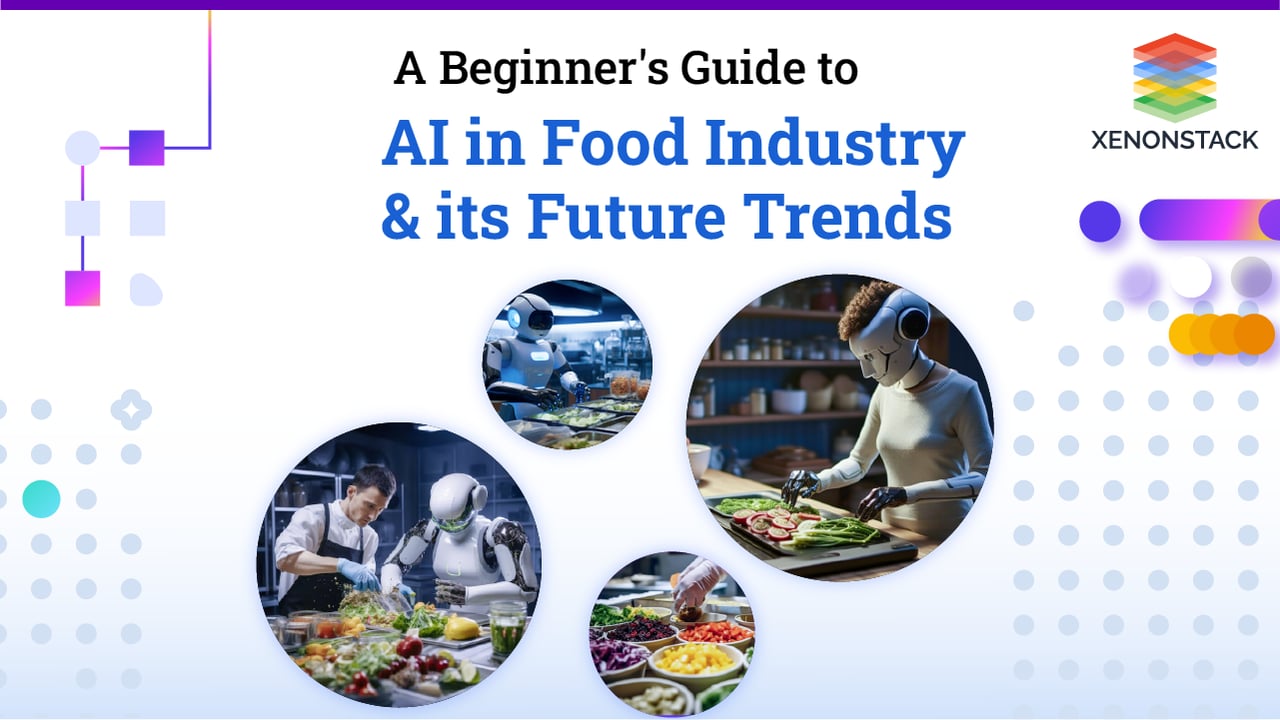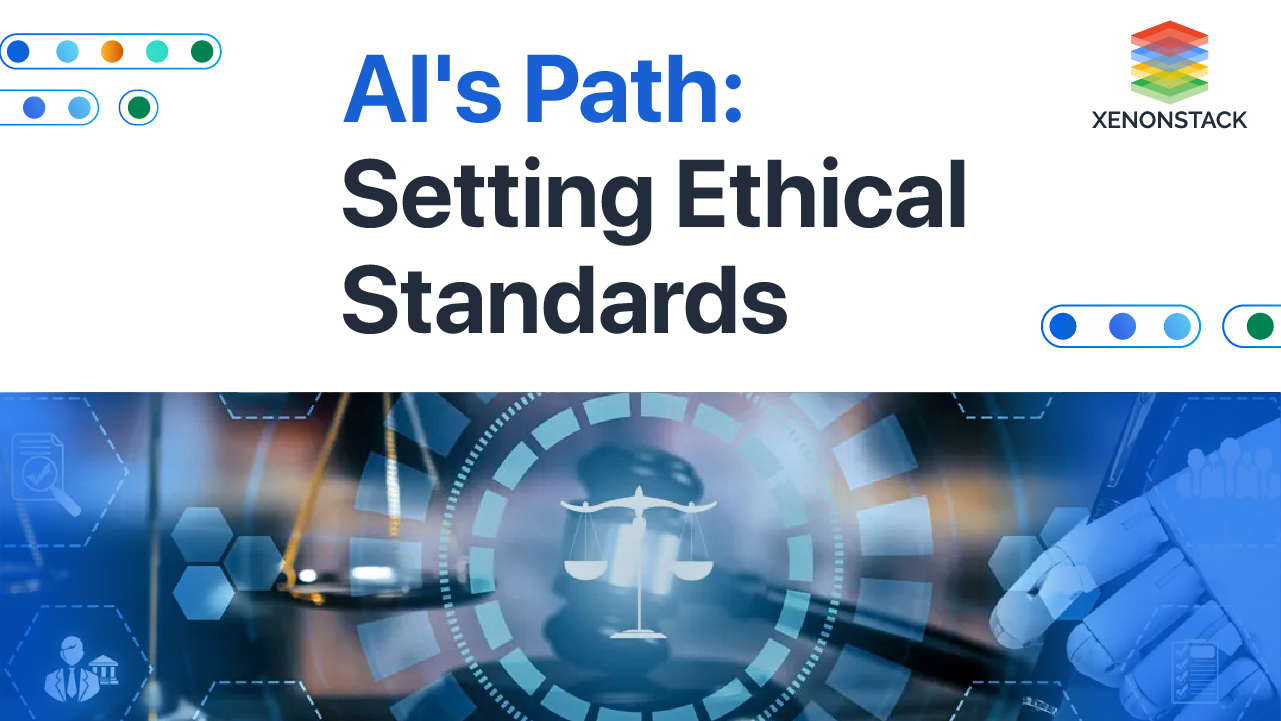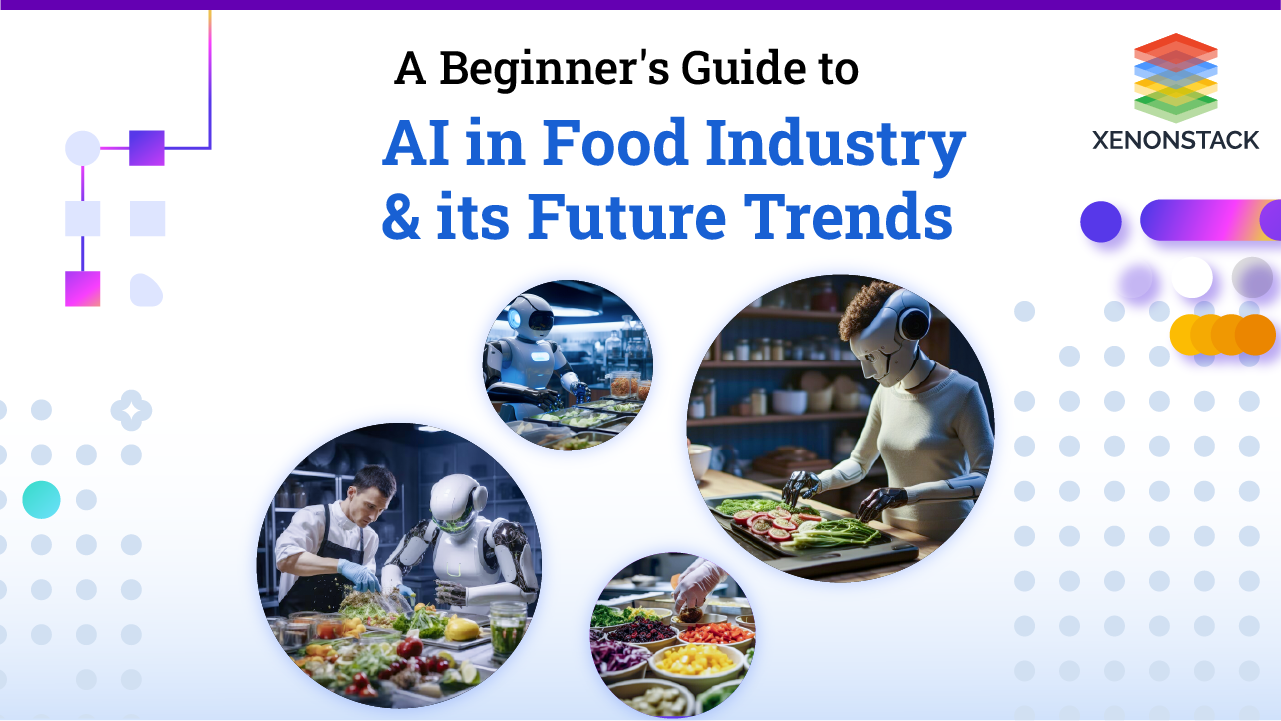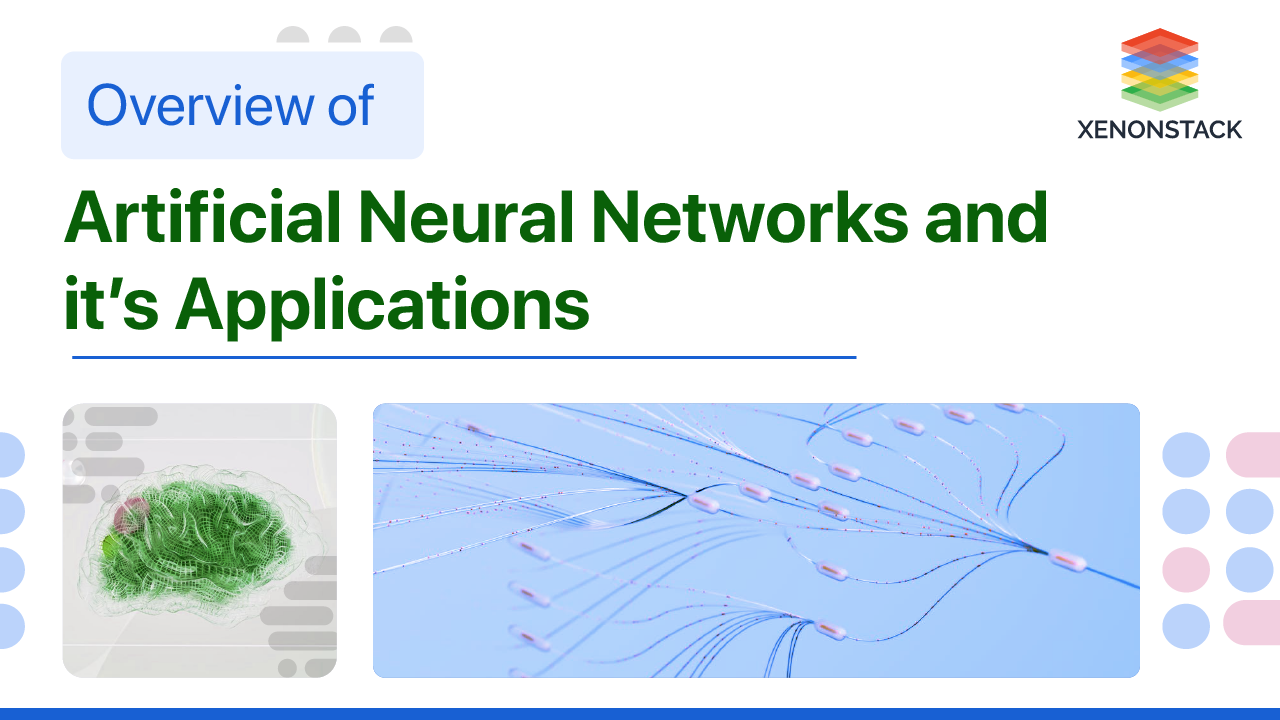
Adopting Artificial Intelligence (AI) technology has tremendously impacted the food business. The food business is changing in many areas, from manufacturing to consumption, thanks to AI, a field of computer science devoted to building intelligent computers that mimic human intelligence. Businesses in the food industry can automate procedures, improve quality control, increase productivity, and provide customers with tailored experiences by leveraging the power of AI algorithms, artificial neural networks, Google AI Services, and AWS AI Services.
How AI is Transforming Food Manufacturing Processes
AI is streamlining processes in the food manufacturing industry through automation and robotics. With these technologies, operations like harvesting, sorting, and packaging may be completed quickly, precisely, and with the least human involvement. Another application of AI is precision agriculture, which uses sensors, drones, and data analytics to improve farming methods. Increased productivity, resource conservation, and environmental sustainability result from farmers' ability to estimate yield, monitor crop health, and manage pests while making educated decisions about irrigation, fertilization, and pest control.
AI is the reproduction of intelligent human processes, especially machines, and computer systems. Taken From Article, Artificial Intelligence Adoption Best Practices
AI is essential for guaranteeing food safety and quality control. AI TRiSM (Trust, Risk, and Security Management) helps ensure transparency in AI-driven food safety measures. Artificial intelligence (AI) systems can detect potential pollutants, spoilage, or flaws in food goods, limiting the distribution of tainted food, lowering health risks, and upholding consumer confidence. Predictive analytics models driven by AI can also foresee quality problems, enabling preemptive actions to be performed to uphold high product standards.
Additionally, AI is transforming the development of food products by improving flavor optimization, component choice, and nutritional profile. Leveraging Compositional AI, businesses can create innovative food products tailored to specific dietary needs. AI algorithms may produce personalized recommendations and develop cutting-edge food products that respond to specific tastes and requirements by analyzing consumer preferences and nutritional data. This enables food businesses to provide customized solutions, encouraging healthy selections and client pleasure.
AI Applications in Food Production: Automation & Quality Control
AI Applications in Food Production are described below:
.png?width=1281&height=1029&name=MicrosoftTeams-image%20(23).png)
Automation and Robotics
Automation and robotics significantly improve the efficiency and productivity of the food manufacturing process. Robots with AI capabilities can be trained to quickly, accurately, and consistently complete repetitive jobs, including sorting, packaging, and assembly. These robots can work alongside humans, handle delicate food products, and operate in dangerous situations, which reduces manual labor and boosts overall production capacity. Businesses in the food industry can streamline operations, cut costs, and boost overall efficiency by automating different production-related steps.
Precision Agriculture
Through the use of AI-enabled precision agriculture, farmers can improve crop management techniques and increase productivity. Farmers may get real-time information on soil composition, moisture levels, weather patterns, and plant health using sensors, drones, and AI algorithms. Farmers can then make informed decisions about irrigation, fertilization, pest management, and harvesting thanks to analyzing this data that produce actionable insights. Precision agriculture minimizes resource waste, lowers environmental impact, and boosts crop output by using the appropriate resources in the right amounts at the right time and place.
Quality Control and Inspection
AI technologies have greatly improved the food industry's quality control and inspection procedures. AI-powered computer vision systems may examine pictures and videos of food goods to find flaws, pollutants, or oddities. AI systems can quickly and precisely identify anomalies by comparing the visual attributes of the products to specified standards. Preventing tainted or damaged products from reaching consumers aids in guaranteeing consistent product quality and safety. By eliminating human inspections, AI-powered quality control and inspection also expedite the procedure and conserve time and money.
Supply Chain Management
By offering real-time insight, optimization, and predictive analytics, AI revolutionizes supply chain management in the food business. To improve supply chain operations, AI algorithms pore over huge volumes of data about inventory, demand trends, transportation, and logistics. Businesses may improve production schedules, reduce waste, and guarantee product availability by using AI algorithms to estimate demand. AI also helps optimize routes, fuel economy improvements, and delivery effectiveness.
AI systems can quickly and precisely identify anomalies by comparing the visual attributes of the products to specified standards. Preventing tainted or damaged products from reaching consumers aids in guaranteeing consistent product quality and safety. By eliminating human inspections, AI-powered quality control and inspection also expedite the procedure and conserve time and money.
By offering real-time insight, optimization, and predictive analytics, AI revolutionizes supply chain management in the food business. To improve supply chain operations, AI algorithms pore over vast volumes of data about inventory, demand trends, transportation, and logistics. Businesses may improve production schedules, reduce waste, and guarantee product availability by using AI algorithms to estimate demand. AI also helps optimize routes, fuel economy improvements, and delivery effectiveness.
Predictive Maintenance
AI can foresee equipment breakdowns in food production plants and carry out predictive maintenance. AI algorithms can identify anomalies and patterns that point to probable malfunctions by analyzing real-time data from sensors and machine performance. This aids in proactively scheduling maintenance tasks, reducing downtime, and improving production procedures.
Energy Optimization
AI algorithms can use energy best in facilities that produce food. AI may find energy-saving opportunities, recommend energy-efficient practices, and improve energy distribution by analyzing data on energy usage, manufacturing schedules, and external factors. This results in financial savings and lessens the impact of food production on the environment.
Sustainability and Waste Reduction
AI can assist in minimizing food waste at every stage of production. AI algorithms can maximize productivity and reduce waste by examining data on inventories, expiration dates, and consumption habits. By offering insights about moral and environmentally responsible suppliers and encouraging sustainable practices in the food business, AI can also help with sustainable procurement.
By enhancing productivity, sustainability, and quality control, these AI applications in food production are transforming the sector and eventually helping farmers and consumers.
AI is essential for maintaining food safety and quality control in the food business. AI technologies are enhancing the diagnosis and prevention of food contamination thanks to their sophisticated data processing and pattern recognition skills.AI's Role in Ensuring Food Safety and Quality
- Food Contamination Detection - AI technologies utilize sophisticated data processing and pattern recognition skills to diagnose and prevent food contamination. By analyzing vast volumes of data from sensors, cameras, and historical records, AI can identify potential hazards and alterations in food production processes.
- Quality Control and Shelf Life Prediction - AI-powered algorithms quickly identify pollutants like germs, pathogens, and foreign materials, reducing the risk of tainted products reaching customers. These algorithms also forecast product shelf life, aiding in reducing food waste and spoilage.
- Predictive Analytics for Quality Control - AI-driven predictive analytics models enable proactive actions to maintain quality control throughout the food supply chain. By analyzing data from various production and distribution chain points, AI can detect patterns and trends indicating potential quality issues and take prompt corrective action.
- Environmental Monitoring - AI systems track and evaluate environmental factors such as temperature and humidity to maintain optimal storage conditions for perishable items, ensuring product freshness and safety.
- Food Fraud Prevention - AI algorithms detect discrepancies and anomalies in data from ingredient origins, supplier records, and quality certifications, aiding in the prevention of food fraud. This enhances customer confidence and transparency by ensuring the authenticity and traceability of food products.
AI in Food Product Development: Innovation & Safety
AI has evolved into a crucial instrument in producing food products, allowing businesses to innovate and produce goods that satisfy ever-shifting consumer wants.
-
Flavor and Ingredient Optimization - AI algorithms analyze sensory data, consumer input, and ingredient attributes to find the perfect blend of flavors and ingredients.This optimization helps food producers create new goods or improve existing ones to better meet customer needs and stand out in the marketplace.
-
Personalized Nutrition - AI algorithms produce customized nutrition regimens by analyzing dietary limits, preferences, and personal health data. Customers can make educated decisions about their dietary needs, considering factors like age, gender, exercise levels, and specific dietary requirements.
-
Recipe Creation and Recommendation - AI algorithms generate fresh and inventive recipes by drawing on vast recipe libraries, ingredient data, and user preferences. AI-powered recommendation systems simplify meal planning and preparation by suggesting recipes based on consumer preferences, dietary restrictions, and available products.
-
Sensory Analysis - AI algorithms assess sensory data such as taste, texture, scent, and visual attractiveness to reveal information about product quality and consumer preferences. This helps food producers improve their products and ensure consistent sensory experiences for consumers.
AI revolutionizes food product development through automation and data-driven insights, promoting innovation, efficiency, and consumer satisfaction in the food industry. Overall, AI is revolutionizing the development of food products by utilizing automation and data-driven insights. AI promotes innovation, efficiency, and consumer happiness in the food business by boosting sensory analysis, personalizing nutrition, developing recipes, and optimizing flavors.
AI and Customer Experience in the Food Industry
Artificial intelligence considerably improves the customer experience in the ever-changing food industry. By utilizing AI technologies, businesses may deliver individualized and effective services that boost client happiness and loyalty. The following bullet points illustrate actual uses of AI in the food business for improving consumer experience:
Chatbots and Virtual Assistants
Artificial intelligence-powered chatbots and virtual assistants are revolutionizing how customers interact with brands. These intelligent systems can interact with customers in real-time, answering their questions, taking orders, and making suggestions. Chatbots can simultaneously respond to several consumer inquiries, reducing response times and increasing efficiency overall. Chatbots can understand and reply to user inquiries effectively when they have natural language processing skills, offering a seamless and individualized experience.
Personalized Recommendations
AI systems analyze client information, such as past purchases, preferences, and browsing history, to provide personalized recommendations. AI-powered recommendation systems make pertinent meal recommendations, promotions, and bargains by knowing individual preferences. In addition to improving the customer experience, this level of personalization increases the possibility of upselling and cross-selling, which raises customer engagement and loyalty.
Intelligent Vending Machines and Kiosks
AI is changing conventional kiosks and vending machines into intelligent systems that provide a more engaging and tailored experience. AI-enabled intelligent vending machines can assess consumer behavior and preferences to suggest appropriate products. Additionally, these devices can offer dietary advice and allergy warnings and even handle cashless transactions, making the purchase experience more convenient and suited to specific requirements.
Menu Optimization
AI is essential to menu optimization, ensuring that companies offer a tasty and lucrative range of culinary items. Artificial intelligence (AI) algorithms examine consumer preferences, sales data, and market trends to suggest menu adjustments, additions, or modifications. AI-powered menu optimization can assist businesses in maximizing income and satisfying client needs by considering variables like popularity, profitability, and ingredient availability.
In conclusion, AI transforms how consumers interact with the food sector using chatbots and virtual assistants, tailored suggestions, intelligent kiosks and vending machines, and menu optimization. Businesses may deliver individualized, effective, and interactive experiences that cater to individual tastes and increase consumer satisfaction by utilizing AI capabilities.
Ethical issues available in the system can only be recognized if data and algorithms are fully understood. Taken From Article, Real-Life Ethical Issues of AI
Ethical and Social Implications of AI in the Food Industry
The social implications and ethics of AI in the Food Industry are below mentioned:
Privacy and Data Security
Concerns concerning privacy and data security have been raised by the use of AI in the food business. Vast amounts of data, including personal data, are collected and processed by AI systems. Thus, it's essential to ensure that data is protected and utilized appropriately. To secure customer privacy, food businesses must set up robust security protocols and follow data protection laws. Clear consent methods and transparent communication must also be in place to educate customers about data collection and usage procedures and promote consumer trust and confidence in the business.
Impact on Employment
AI technology in the food business could have an employment effect. There are concerns regarding job displacement due to the potential replacement of some work roles by automation and AI-driven systems. Businesses and policymakers must address these issues by reskilling and upskilling the workforce, creating new job possibilities, and ensuring that workers impacted by technological improvements have a just transition. To fully utilize AI while considering its societal and economic ramifications, a balance must be struck between AI-driven automation and human labor.
Fairness and Bias in AI Algorithms
AI algorithms employed in the food business must be impartial and free from bias. Inequalities and existing discriminatory practices can be reinforced and amplified by biased algorithms. To reduce bias and prevent the perpetuation of social injustices, it is essential to ensure AI systems are trained on various representative datasets. To advance equity and inclusion in the food business, methods for recognizing and correcting biases should be established, and regular auditing and testing of AI algorithms for fairness and bias.
Trust and Consumer Acceptance
Building customer trust and accepting AI technology is essential for its effective use in the food sector. Gaining consumer trust requires openness and transparent communication about how AI is employed its advantages, and its possible drawbacks. Explaining and justifying AI-driven judgments, particularly in product development and personalized suggestions, can increase user acceptability. Fostering trust and long-term consumer confidence in AI-powered solutions requires ensuring that AI systems are created with ethical considerations, such as data privacy, fairness, and safety.
To fully utilize AI in the food business and ensure its ethical and fair application, addressing these ethical and societal issues is essential. Building a sustainable and inclusive future for AI in the food business requires balancing technology improvements and moral issues.
Future Trends and Challenges of AI in the Food Industry
The future of AI in the food business is expected to usher in revolutionary trends while posing fundamental problems that must be solved. Machine learning and profound learning developments will fuel more complicated AI models capable of evaluating complex data and providing more accurate predictions and insights. This will make improvements in fields like food safety, product creation, and supply chain optimization possible.
-
IoT, Blockchain, and AI Integration in the Food Industry: The Internet of Things (IoT), blockchain technology, and AI integration will further transform the food business. Real-time data collection from linked devices is made possible by integrating AI and IoT, improving the monitoring of food production, quality assurance, and logistics. Integrating AI with blockchain can improve the food supply chain's transparency, traceability, and trust, ensuring the products' authenticity and safety.
-
Regulatory Challenges in AI Adoption: Regulatory concerns, however, make it difficult for AI to become widely used in the food business. Substantial restrictions are required as AI technologies proliferate to handle issues with data privacy, security, and the ethical application of AI. Regulations should balance innovation with consumer protection while covering data collection and utilization, algorithm openness, and accountability.
-
Overcoming AI Adoption Barriers: Overcoming adoption-related obstacles is yet another critical challenge. AI application in the food business necessitates significant infrastructural, technological, and labor force investments. Organizations must also deal with issues like job loss, staff retraining, and ensuring a smooth transition to AI-driven systems. Collaboration between industry stakeholders, policymakers, and researchers is essential to overcome these obstacles, promote information exchange and best practices, and develop a culture of AI readiness.
To summarize, the potential for AI in the food sector is enormous. Harnessing the full potential of AI and revolutionizing the food business depends on advancements in machine learning and deep learning, integration with IoT and blockchain, addressing regulatory issues, and removing adoption hurdles. The food industry can embrace AI as a catalyst for innovation, efficiency, and sustainability by navigating these trends and obstacles, eventually benefiting farmers, consumers, and the entire food ecosystem.
AI’s Long-Term Impact on Food Business Strategies
In the food business, AI has become a transformational force reshaping numerous facets of the entire food ecosystem. Artificial intelligence (AI) technologies like machine learning, deep learning, and natural language processing drive efficiency, creativity, and sustainability across various industries, from manufacturing and quality control to customer experience and beyond. AI has many applications in the food sector, from robotics and automation in food manufacturing to tailored nutrition, recipe creation, and improved consumer interactions.
However, adopting AI in the food sector also raises significant issues. Concerns about privacy, bias, and trust must be considered to ensure AI's ethical and equitable usage. Regulatory frameworks and data protection safeguards must be put in place to protect consumer privacy and guarantee fairness in AI algorithms. For AI technology to be widely used, adoption hurdles must be removed, including infrastructure investments and worker reskilling.
Next Steps in Adopting AI for a Smarter Food Industry
Talk to our experts about implementing AI-driven food processing systems. Learn how industries and different departments use Agentic Workflows and Decision Intelligence to become decision-centric. Utilize AI to automate and optimize food production and operations, improving efficiency and responsiveness.



